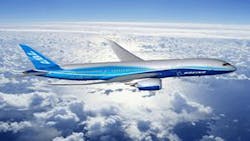Union Blames Boeing 787 Woes on Outsourcing
WASHINGTON -- Boeing's engineers union blamed the problems with the grounded 787 Dreamliners on outsourcing as it rejected the U.S. aerospace giant's "final" contract offer.
After months of negotiations, and with current contracts expired, Boeing said late Thursday it had made its "best-and-final contract offer" to the Society of Professional Engineering Employees in Aerospace.
SPEEA union negotiators, representing 23,000 Boeing engineers and technical workers, unanimously rejected the offer.
They said approval for a strike may be on the ballots when the union members themselves vote on the contract offer.
The union said its members had been left out of the Federal Aviation Administration's safety review of the 787 Dreamliner, announced last week before a battery problem on a 787 in Japan led to the global grounding of 787s Thursday.
"Boeing corporate created the 787 problems by ignoring the warnings of the Boeing technical community," Joel Funfar, one of the union negotiators, said.
"Now, they propose to double down on their failed outsourcing strategy by outsourcing the engineering work required to solve the problems caused by previous rounds of outsourcing."
Breaking with its former largely in-house production practice, the U.S. aerospace giant outsourced much of what went into its newest jet, with its pioneering electrical systems and heavy use of carbon-fiber composite materials.
Parts came into Boeing's assembly plants from 135 other sites and 50 suppliers, including from Japanese firm GS Yuasa, which built the batteries that led to the 787 groundings.
In a statement late Thursday, Boeing said it had made a "market-leading" offer to the union that includes five percent annual salary increases.
The proposal would retain current employees' traditional pension plans, but new hires would have a retirement-savings plan.
Copyright Agence France-Presse, 2013
About the Author
Agence France-Presse
Copyright Agence France-Presse, 2002-2025. AFP text, photos, graphics and logos shall not be reproduced, published, broadcast, rewritten for broadcast or publication or redistributed directly or indirectly in any medium. AFP shall not be held liable for any delays, inaccuracies, errors or omissions in any AFP content, or for any actions taken in consequence.
